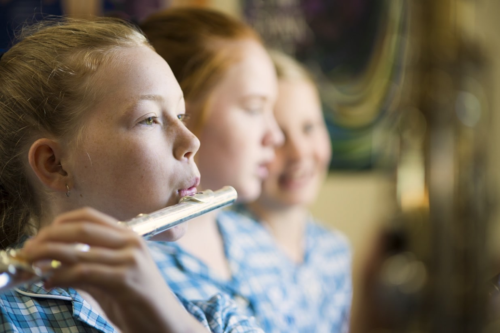Why children should learn to play a musical instrument
Plato once stated that Music gives wings to the mind, and this is certainly true. Music plays a large role in most people’s lives and we are surrounded by the tunes of music daily – from the radio, TV, and digital streaming to supermarket soundtracks and gym playlists. Whether we actively or passively listen, music is there to soothe or motivate and is almost always around us.
And it’s not just listening that has its advantages, learning how to play an instrument has increased benefits for our health and wellbeing, especially for children. Playing an instrument is a complex task involving both physical body and cognitive brain functions whilst also being a social activity that is both fun and rewarding. When your child learns to play an instrument, the benefits are both instant and long-term and it gives your child the pleasure of understanding and playing music for a lifetime.
Here are a few of the great benefits of playing a musical instrument:
1. Physical benefits of playing an instrument
Playing an instrument requires an array of physical skills, including the mastery of using body movements from the hands, arms and feet – often simultaneously. The benefits are many; your child will strengthen small muscles whilst increasing the ability to coordinate both the left and right sides of their body.
Learning how to play the guitar, for instance, requires the coordination of both hands and fingers. This can greatly improve handwriting ability and handling of smaller objects.
2. Playing music enhances brain development
Playing an instrument is important for developing vital functions in the brain. Research from the St John Fisher College in Queensland indicates that the cognitive communication between different areas in the brain are strengthened, especially between the left and right brain. This improves your child’s ability to understand and digest information, memory, languages, patterns and structures in the classroom.
Learning how to play the piano, for example, requires the ability to plan and structure a song. It teaches your child that each piano key creates a different sound and that together, the instrument and keys can create a melody or tune.
3. Creating music in social groups
Creating and playing music in social groups are great ways for your child to develop skills in time management, the ability to work in a team, concentration and listening, and it will enhance your child’s self-confidence and ability for self-expression.
Nina Kraus, study lead author at Northwestern University, Illinois, said, “…Music programs can literally ‘remodel’ children’s brains in a way that improves sound processing, which could lead to better learning and language skills.”
Attending a music class, joining a band or signing up to take part in a choir will also give your child a sense of belonging. Each child and their instrument or voice play an important role in the overall performance of the group, making everyone feel part of something bigger.
4. Planning short and long-term goals together
A great way to start each new school term is to sit down with your child and ask them what their short and long-term goals are with their music lessons. Ask questions like, “What would you like to improve?” and “What would you like to do to achieve this goal by the end of the term?”.
By creating an overview of practical steps needed to reach their end goals, your child will get an increased sense of motivation, discipline and ultimately, at the end of the term, a sense of accomplishment.
Music education plays an important role and can enhance your child’s life in many areas. At Living Waters Lutheran College, we offer your child the opportunity to learn a musical instrument through the Instrumental Tuition Program. Experts across a range of instruments are available throughout the week to tutor students from Year 1 to Year 12. For more information please visit Music and Arts on our website. or email the Head of Music, Michelle Hahn MHahn@livingwaters.wa.edu.au for further information.
If you are interested in finding out more about how our College builds bright futures, please download our Prospectus.
Written by imageseven and Head of Music, Michelle Hahn



